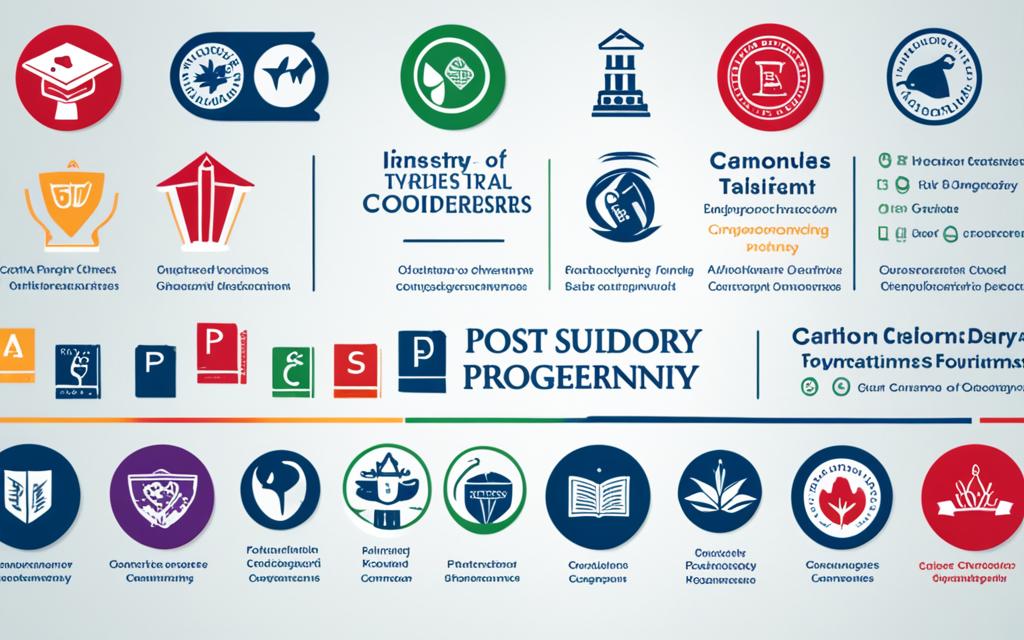A post secondary school is an institution that offers advanced education beyond high school. It provides students with the opportunity to further their academic and professional development in various fields. Whether you’re looking to pursue a specific career path, gain specialized knowledge, or simply expand your horizons, a post secondary school can be the stepping stone to achieving your goals.
From colleges to universities, post secondary schools offer a wide range of programs and degrees that cater to different interests and aspirations. They provide a supportive environment for students to engage in advanced learning, discover new passions, and prepare for future career opportunities.
Key Takeaways
- A post secondary school offers higher education beyond high school.
- There are various types of post secondary schools, such as colleges and universities.
- Post secondary schools provide a wide range of programs and degrees.
- Attending a post secondary school can lead to enhanced career opportunities and personal growth.
- Consider a post secondary education to further your intellectual and professional development.
Definition of Post Secondary School
In the journey of education, post secondary school plays a vital role in shaping one’s future. A post secondary school is a dynamic institution that provides advanced education beyond high school. It equips students with the necessary knowledge, skills, and qualifications to pursue their desired career paths in a specific field of study. Post secondary schools are the gateway to higher education, offering a multitude of academic programs and degrees to cater to diverse interests and aspirations.
Post secondary schools are dedicated to providing a comprehensive learning experience that goes beyond the foundational knowledge acquired in primary and secondary education. They offer a range of programs, including vocational training, diplomas, associate degrees, bachelor’s degrees, and even postgraduate studies. The curriculum at post secondary schools is designed to be more specialized and in-depth, focusing on the specific subjects and disciplines that students choose to pursue.
Higher education is an essential component of personal and professional growth, and post secondary schools play a critical role in facilitating this development. They emphasize critical thinking, analytical skills, and practical application of knowledge through hands-on learning experiences. Post secondary education opens doors to new opportunities, allowing individuals to explore their interests, discover their passions, and prepare for successful careers in their chosen fields.
“Post secondary education is the bridge that connects the foundation of basic education to the advanced knowledge and skills required in today’s competitive job market.” – University of California
Post secondary schools foster an environment that encourages innovation, collaboration, and independent thinking. Students have the opportunity to interact with experts in their respective fields, engage in research, and participate in internships or co-op programs. These experiences help develop valuable industry connections and real-world skills that are highly sought after by employers.
Furthermore, post secondary education encompasses more than just academics. It also promotes personal growth, self-discovery, and the development of important life skills. Students learn to manage their time effectively, work in teams, communicate confidently, and adapt to new situations. These skills are invaluable in today’s fast-paced and ever-changing world.
Post Secondary School vs. Higher Education
It’s important to note that post secondary school is often used interchangeably with the term “higher education.” While they share similarities, they have slight differences in their scope. Post secondary school refers specifically to the educational institutions that offer advanced education beyond high school, while higher education encompasses a broader umbrella term that includes all forms of education beyond secondary schooling, including vocational schools, colleges, universities, and graduate schools.
| Post Secondary School | Higher Education |
|---|---|
| Offers advanced education | Includes post secondary schools and more |
| Focuses on specialized fields of study | Encompasses various educational pathways |
| Prepares students for specific careers | Provides a wide range of academic opportunities |
Post secondary school is an important stepping stone in the pursuit of higher education. It sets the foundation for lifelong learning, personal growth, and professional success. By providing advanced education and specialized training, post secondary schools empower individuals to thrive in their chosen fields and make meaningful contributions to society.
Types of Post Secondary Schools
When it comes to post secondary education, there are various types of institutions that offer opportunities for advanced learning. Two common types of post secondary schools are colleges and universities.
Colleges:
Colleges typically provide undergraduate education and award associate’s and bachelor’s degrees. They offer a wide range of programs and courses in various disciplines, including but not limited to arts, sciences, business, and technology. Colleges often have a more intimate learning environment with smaller class sizes, allowing for more personalized attention from professors.
Universities:
Unlike colleges, universities usually offer both undergraduate and graduate programs. They provide a broader range of academic disciplines and professional fields, including liberal arts, engineering, medicine, law, and more. Universities often have larger campuses, extensive research facilities, and faculty who are recognized experts in their fields. They also tend to have a more diverse and international student body.
Both colleges and universities serve as post secondary institutions, preparing students for careers and higher levels of education. They provide opportunities for intellectual growth, skill development, and networking. The choice between a college or a university depends on various factors such as career goals, academic interests, and personal preferences.
Comparing Colleges and Universities
To further understand the differences between colleges and universities, let’s take a look at a comparison table:
| Colleges | Universities |
|---|---|
| Offer associate’s and bachelor’s degrees | Offer associate’s, bachelor’s, and graduate degrees |
| Smaller class sizes | Larger class sizes |
| Focus on undergraduate education | Offer both undergraduate and graduate programs |
| More intimate learning environment | More diverse student body |
| Offer a wide range of programs and courses | Provide a broader range of academic disciplines and professional fields |
As seen in the table above, colleges and universities have their own unique characteristics, allowing prospective students to choose the institution that aligns best with their educational and career aspirations.
Admission and Requirements for Post Secondary Schools
When it comes to pursuing higher education, the admission process and requirements for post secondary schools play a crucial role. These institutions have specific guidelines in place to ensure that they admit students who are well-suited to their academic programs and can thrive in their chosen fields of study.
Applying to a post secondary school starts with understanding the admission process. Each institution may have its own unique application process, but the underlying goal remains the same – to gauge the suitability of prospective students and determine their potential for success.
The application serves as the initial step in the admission process. It requires students to provide essential information such as personal details, academic records, and any relevant accomplishments. Additionally, applicants often need to submit an essay or personal statement highlighting their interests, motivations, and goals.
Post secondary schools may also require students to take standardized tests like the SAT or ACT. These tests assess a student’s abilities in areas such as math, reading, and writing and serve as a standardized benchmark for comparing applicants.
“The admission process is designed to identify students who not only meet the academic requirements but also possess the drive, passion, and potential to contribute to the vibrant learning community of the institution.”
Moreover, certain programs or fields of study may have specific prerequisites or additional requirements. For example, students interested in pursuing a science or engineering degree may need to have completed certain high school courses or demonstrate proficiency in specific subjects before they can be considered for admission.
It is important for prospective students to research and understand the admission requirements of the post secondary schools they are interested in. By doing so, they can adequately prepare themselves and ensure they meet all the necessary criteria before submitting their applications.
Ultimately, the admission process for post secondary schools is a comprehensive evaluation aimed at identifying individuals who possess the talent, dedication, and potential to succeed in their chosen academic pursuits. By understanding and fulfilling the requirements, students can increase their chances of gaining admission to their desired post secondary institutions.

Post Secondary Programs and Degrees
In post secondary schools, students have access to a wide range of programs and degrees that cater to diverse interests and career aspirations. These institutions offer a plethora of academic disciplines and specialized fields of study, enabling individuals to pursue their passions and develop the necessary skills for success in their chosen fields. Whether you are interested in business, technology, arts, healthcare, or any other area, post secondary schools have programs designed to meet your educational and professional goals.
Post secondary programs span various durations, from short-term certificate programs to comprehensive undergraduate and graduate degrees. Certificate programs are excellent options for individuals who want to acquire specific skills and knowledge in a relatively short period. They provide practical and specialized training that prepares students for entry-level positions in their chosen industries.
Associate degrees, offered at community colleges and technical institutes, equip students with foundational knowledge in their chosen fields. These two-year programs provide a stepping stone for further education or immediate entry into the workforce.
Bachelor’s degrees are typically four-year programs that offer a comprehensive curriculum in a specific academic discipline. They provide a well-rounded education, combining core subject areas with specialized courses. Bachelor’s degrees open doors to a wide range of career opportunities and serve as the foundation for further academic pursuits.
For individuals seeking advanced knowledge and expertise, post secondary schools also offer graduate degrees such as master’s and doctoral degrees. Master’s degrees provide a deeper understanding of a specific field and often involve research or a thesis component. Doctoral degrees are the highest level of academic achievement and require significant research and a dissertation to contribute original knowledge to a particular field.
“Post secondary programs and degrees provide individuals with the opportunity to explore their interests, enhance their knowledge, and acquire the skills necessary for professional success. Whether you aim to become an engineer, a nurse, an artist, or a business leader, these programs offer the resources and guidance you need to pursue your dreams.”
To illustrate the broad spectrum of offerings, below is a table showcasing a selection of post secondary programs and the corresponding degree levels:
| Program | Degree Level |
|---|---|
| Computer Science | Bachelor’s, Master’s |
| Nursing | Associate, Bachelor’s, Master’s, Doctoral |
| Business Administration | Bachelor’s, Master’s |
| Graphic Design | Associate, Bachelor’s |
| Engineering | Bachelor’s, Master’s, Doctoral |
| Education | Bachelor’s, Master’s, Doctoral |
As you can see from the table above, post secondary programs cater to a diverse range of interests and career pathways. No matter your passion or ambition, there is a program and degree that can support your educational and professional journey.

Benefits of Attending a Post Secondary School
Attending a post secondary school offers a plethora of benefits that extend far beyond the classroom. These institutions provide individuals with the opportunity to pursue advanced learning, open doors to enhanced career opportunities, and foster personal growth.
One of the key advantages of post secondary education is the access to advanced learning. These schools offer a wide range of programs, allowing students to specialize in their areas of interest. Whether it’s studying sciences, arts, business, or technology, post secondary schools provide the resources, faculty, and facilities needed for in-depth learning and exploration.
“Post secondary education equips students with the knowledge and skills necessary to thrive in today’s competitive job market. It offers a chance to delve deeper into subjects they excel in and develop expertise that can set them apart professionally.”
By attending a post secondary school, individuals gain a competitive edge in their chosen field. The opportunities for career advancement and growth are significantly greater for those who hold post secondary degrees or certifications. Many professions require a higher level of education beyond high school, and with a post secondary education, individuals can pursue diverse career opportunities.
Moreover, attending a post secondary school not only focuses on academic development but also nurtures personal growth. Students are exposed to a diverse range of perspectives and cultures, fostering open-mindedness and global awareness. They gain valuable life skills such as critical thinking, problem-solving, and effective communication, which are essential for success in any profession.
The Benefits of Attending a Post Secondary School:
- Access to advanced learning in specialized fields
- Enhanced career opportunities and marketability
- Personal growth through exposure to diverse perspectives
- Development of valuable life skills
Attending a post secondary school is a transformative experience that empowers individuals to pursue their passions, broaden their horizons, and achieve professional success. By investing in higher education, students lay a solid foundation for a fulfilling and prosperous future.
Conclusion
Attending a post secondary school is an important next step for individuals seeking further intellectual and professional development. Throughout this article, we have explored the definition of post secondary schools and their purpose in offering advanced education beyond high school. We have also discussed the different types of post secondary schools, such as colleges and universities, and their unique characteristics.
In addition, we have delved into the admission process and requirements for post secondary schools, providing insights into applications, standardized tests, and other prerequisites. Furthermore, we have explored the various programs and degrees offered, showcasing the diverse range of academic disciplines and career pathways available.
By attending a post secondary school, individuals can benefit from access to advanced learning, enhanced career opportunities, and personal growth. Whether it is acquiring specialized knowledge, expanding one’s professional network, or gaining practical skills, post secondary education plays a vital role in shaping a successful future.
FAQ
What is a post secondary school?
A post secondary school is an educational institution that offers advanced education beyond high school. It provides individuals with the opportunity to further their knowledge and skills in a specific field of study.
What is the definition of a post secondary school?
A post secondary school is a higher educational institution that offers various programs and degrees to individuals who have completed their high school education. It aims to provide advanced learning opportunities and prepare students for their desired careers.
What are the different types of post secondary schools?
Post secondary schools include colleges and universities. Colleges typically focus on specific disciplines and offer associate degrees, certificates, and diplomas. Universities, on the other hand, provide a wider array of programs and offer undergraduate and graduate degrees in various fields of study.
What are the admission requirements for post secondary schools?
Admission requirements for post secondary schools vary depending on the institution and program. Generally, they include submitting an application, providing high school transcripts, standardized test scores, letters of recommendation, and sometimes an application essay. Some programs may have additional prerequisites, such as specific coursework or portfolio submissions.
What programs and degrees are offered by post secondary schools?
Post secondary schools offer a broad range of programs and degrees across different academic disciplines. These can include liberal arts, business, engineering, health sciences, social sciences, and more. Degrees can vary from associate degrees, bachelor’s degrees, master’s degrees, to doctoral degrees, depending on the level of specialization and the chosen field of study.
What are the benefits of attending a post secondary school?
Attending a post secondary school provides numerous benefits. It offers advanced learning opportunities, access to specialized knowledge and training in specific fields, enhanced career prospects, networking opportunities, personal growth, and a chance to develop critical thinking and problem-solving skills.
Why should individuals consider attending a post secondary school?
Individuals should consider attending a post secondary school to expand their intellectual horizons, acquire in-depth knowledge in their chosen field, improve their career prospects, and open doors to better job opportunities. It is a crucial step towards personal and professional development and can significantly impact an individual’s future success.





